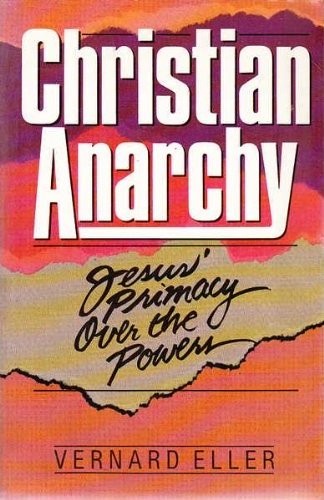The new phone books are here! The new phone books are here!
Not really, but I am in print!
I may have mentioned that I was putting together a bibliography of sorts for Geez Magazine's "Worship and Anarchy" issue. My piece isn't available online, so I'll post it here. But if you want a hard copy--and you really should, it's a great issue!--you can order one HERE.
These are books I'd recommend if you are interested in learning more about Christian anarchism. Any of them would be a great starting place if you're just looking into it, or a place to dig a bit deeper.
Not really, but I am in print!
I may have mentioned that I was putting together a bibliography of sorts for Geez Magazine's "Worship and Anarchy" issue. My piece isn't available online, so I'll post it here. But if you want a hard copy--and you really should, it's a great issue!--you can order one HERE.
These are books I'd recommend if you are interested in learning more about Christian anarchism. Any of them would be a great starting place if you're just looking into it, or a place to dig a bit deeper.
Let me know what you think. Have you read these? What would you add to the list?
The Kingdom of God is Within You (1894)
by Leo Tolstoy
|
This classic has influenced anarchists and nonviolent resisters from Ammon Hennacy to Gandhi and
Martin Luther King, Jr., and is an enduring cornerstone of the anarchist
canon.
*Available for free online – Google Books, Kindle
|
Anarchy and Christianity (1988)
by Jacques Ellul
|
A short, accessible argument for Christian
anarchism, directed at both anarchist and Christian skeptics. Ellul
challenges the involvement of the church
in the politics of the nation-state and encourages the reader to imagine a
more Christ-like alternative.
Also recommended: Violence and The Subversion of
Christianity
|
Anarchism and Other Essays (1910)
by Emma Goldman
|
Reading
Goldman, a committed atheist who sometimes supported violence, is important
for giving shape to an anarchistic worldview. Plus, she’s a formidable early
anarcha-feminist you want to know about.
*Available for
free online – Google Books, Kindle
|
The Long
Loneliness (1952)
by Dorothy Day
|
This autobiography gives us a glimpse into what a life shaped by
Christian anarchism looks like. Day, who created the Catholic Worker anarchist
newspaper and founded Hospitality Houses that fed and clothed the poor, had a
passion for “making the world a place where people can be better human
beings.”
|
The Politics of Jesus (1972)
by John Howard Yoder
|
Yoder,
an anabaptist theologian who has been influential for Christian anarchists,
takes Jesus as a “model of radical political action.” He shows how the Jesus
of Christendom hardly resembles the Jesus of the gospels. Truly following
Jesus should change our social ethic to the countercultural ethic of the Beatitudes
and Jubilee.
|
Living on Hope
While Living in Babylon (2009)
by Tripp York
|
In York’s
analysis, the Christian anarchist politic is apocalyptic rather than
apolitical. He shows how it has been lived out by well-known
anarchists like Dorothy Day and Clarence Jordan. The tone is hopeful: York
presents a Christian anarchist way of life as not only viable but even
fruitful.
|
The Myth of a Christian
Nation (2007)
by Gregory Boyd
|
Boyd tackles the creeping
problem of Christian patriotism in the United States and challenges believers
to rethink the way they engage in politics instead of buying
into the evangelical myth of the religious right.
|
Resident Aliens (1989)
by Stanley Hauerwas and William
Willimon
|
This book isn’t explicitly
anarchist, but it challenges Christians to think critically about our cultural contexts and how to live as a colony
of believers – in the world and yet not of the world.
|
Waging
Nonviolent Struggle (2005)
by Gene Sharp
|
Sharp is
neither overtly anarchist nor Christian, but he offers a “social view of
power” – that power comes from the people and is dependent on their
cooperation. He advocates for nonviolence as an effective means for oppressed
people to create change and lists 198 different methods of nonviolent action.
|
That Holy
Anarchist (2012)
Mark Van Steenwyk
|
A quick read that covers
the basics of Christian anarchism as well as its most common challenges. Van
Steenwyk provides a very accessible and informative primer on the anarchistic
leanings of Jesus.
|
Jesus For President (2008)
Shane Claiborne and Chris
Haw
|
Designed in
full colour with a DIY aesthetic, this book uses the stories
of ancient Israel and the early church to frame the way Christians may think
about government and rulers today.
|
Oppression and Liberty (1955)
by Simone Weil
|
Simone Weil was an
anarchist-turned-Catholic mystic. A well-educated
early-twentieth-century woman, she offers a unique, thorough and
philosophical perspective on power and politics, and a particularly
apt criticism of Marx.
|
Christian Anarchy (1987)
by Vernard
Eller
|
In a
scholarly yet informal style, Eller provides many “whys” of Christian
anarchy, explaining how kingdom of God “arky” is so different from wordly
“arkys” and therefore how Christians should think and live differently.
*Available for free online HERE
|
| Christian
Anarchism: A Political Commentary on the Gospel (2010) byAlexandre Christoyannopoulos | With accessible academic style, Christoyannopoulos presents an extensively researched and thorough study of Christian anarchism that includes its origins and history, prominent leaders and influencers, and biblical and theological supporting theories. |

















